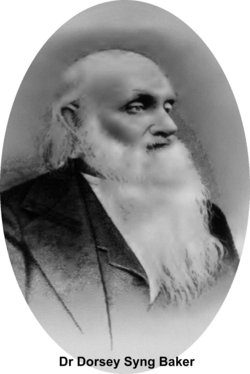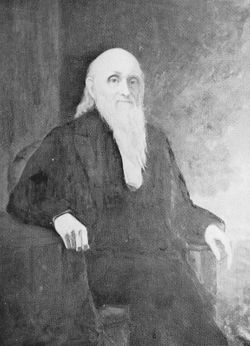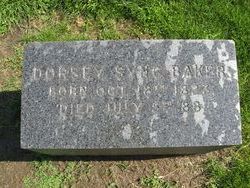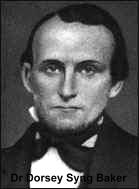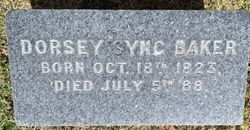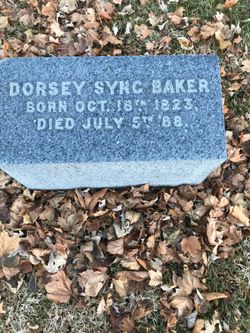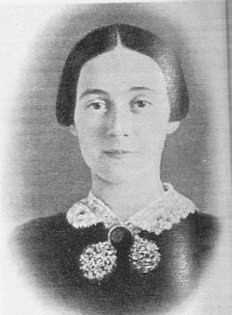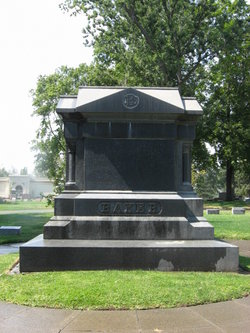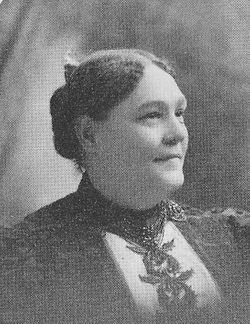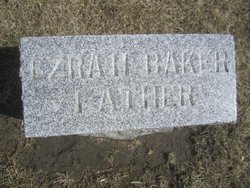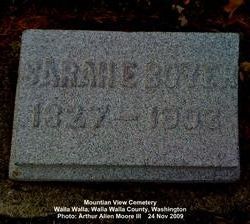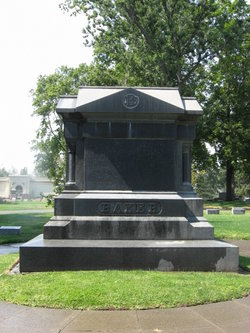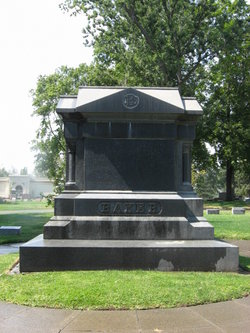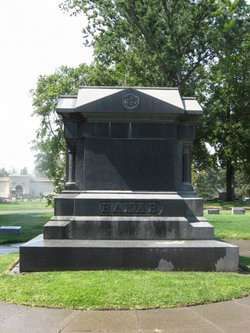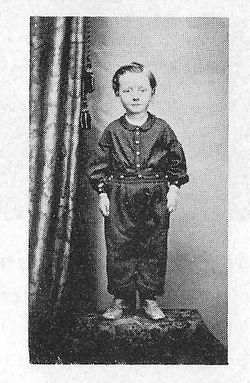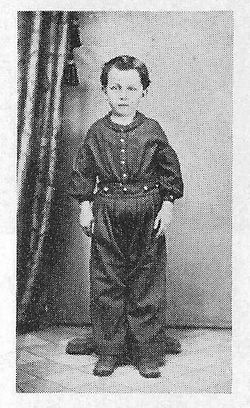| Description |
: |
Father: Ezra Baker
794-1870
Mother: Elizabeth Haupt
1794-1852
Marriage #1: Caroline Tibbetts
Daughter of Gideon and Mary Fox Tibbetts, Dorsey & Carline married on June 16, 1850 in Portland. This union gave four children: Edwin Franklin (E.F. or Frank), Mary Elizabeth (Molly), Henry Clay Dorsey (H.C.), and William W. (Walla Walla Willie or W.W.). Three other children of this unuion died in infancy. Caroline died at age 29.
Marriage #2: Mary Angeline LEGIER
In 1865, Dorsey married Mary Legier of Tuscola, Illinois. Mary, however, became ill and died in Walla Walla a few weeks later after the marriage.
Marriage #3: Elizabeth Millican
In 1867, Dorsey married...
Read More
|
Father: Ezra Baker
794-1870
Mother: Elizabeth Haupt
1794-1852
Marriage #1: Caroline Tibbetts
Daughter of Gideon and Mary Fox Tibbetts, Dorsey & Carline married on June 16, 1850 in Portland. This union gave four children: Edwin Franklin (E.F. or Frank), Mary Elizabeth (Molly), Henry Clay Dorsey (H.C.), and William W. (Walla Walla Willie or W.W.). Three other children of this unuion died in infancy. Caroline died at age 29.
Marriage #2: Mary Angeline LEGIER
In 1865, Dorsey married Mary Legier of Tuscola, Illinois. Mary, however, became ill and died in Walla Walla a few weeks later after the marriage.
Marriage #3: Elizabeth Millican
In 1867, Dorsey married Elizabeth Millican Horton McCullough (Lizzie). They had eight daughters, four of whom died during a diphtheria epidemic. Ida Mabel, Anna Amelia, Rosalia Imogene, and Ada Louise survived.
__________________________________________
Dr. Dorsey Syng Baker
Co-Founder: Baker Boyer Bank
Dorsey S. Baker was born in 1823 in Wabash County, Illinois. A Graduate of Jefferson Medical College in Philadelphia, he began a career as a medical doctor in 1845. However, practicing medicine didn't seem to spark his interest as much as did entrepreneurism.
In 1848 he traveled west, crossing the plains to Oregon before following the lure of gold in California one year later. He returned to the Northwest in 1850 to begin a varied career in Portland, the Umpqua Valley and in Eastern Washington. He became the motivating force behind a wide range of commercial enterprises including milling, raising livestock, grain farming, freighting, steam boating on the Columbia and Snake Rivers and several ventures in merchandising.
Dr. Baker came to Walla Walla in October 1859 to open a mercantile. Baker placed William Stephens in charge, but took over himself one year later. John F. Boyer, Baker's brother-in-law, partnered with him in 1862 and together they established the firm D.S. Baker & Company.
Although the firm was considered a mercantile business, ledgers show receipts and withdrawals, loans and the purchase and sale of bullion and gold dust. The ledgers indicate that the firm was even then performing many of the functions of a bank.
With the decline of mining and the increase in farming, Dr. Baker's sharp business sense led him in a new direction. Perhaps best known of Baker's business achievements was the construction of a railway that connected Walla Walla with steamboat transportation at the river port of Wallula. In 1872, using his personal funds, Dr. Baker set out to construct the railroad. In 1875, The Walla Walla & Columbia River Railroad was complete. This connection was profitable for Dr. Baker (even at half the previous cost of freight) as well as vital to the expansion of grain growing, the number one industry in Eastern Washington today.
After only a few years of operation, Baker anticipated the completion of the transcontinental railroad. In 1879, he sold a majority interest to the Oregon Steam Navigation Company. The remainder was sold to Henry Villard. It eventually became a branch line of the Union Pacific Railroad.
For more than 40 years Baker's usual form of organization, with the exception of the railroad, was partnerships. In most of these arrangements, profits were divided on a 50/50 basis, although Baker ordinarily furnished the greater portion of partnership capital. This allowed Baker the time and freedom to study, analyze and innovate to meet a wide variety of frontier opportunities.
Dr. Baker's commitment to this community was expressed not only through mutually beneficially business ventures, but also with his generous contribution of time, money and land. One of his more visible contributions was the donation of land for the original site for Whitman Seminary—his gift becoming the nucleus of the present Whitman College property.
___________________________________
Source:
Guide to the Baker Family Collection
1850-1970
Walla Walla's dynastic Baker family began with Dorsey Syng Baker, known commonly as D.S. He began creating a business empire in the mid-19th century in the Oregon and Washington Territories. He began his journey to the west, not as an entrepreneur, but as a young doctor. Dorsey followed the pioneer trails across the prairie from Wabash County, Illinois, where he was born on October 18, 1823, to Elizabeth Haupt and Dr. Ezra Baker, Jr. He was their fourth son, following brothers Ezra Haupt, Edwin Sebastian, and Barton Peisch Baker. There was also a younger sister, Sarah Elizabeth, who married John F. Boyer, who was Dorsey's business partner in what became Baker-Boyer National Bank.
Dorsey's energy and financeering dominated considerable business interests in the early days of non-Native American settelment in the Idaho, Oregon, and Washington territories. His progeny kept that pace. Their substantial range of influence has affected many forms of commerce and civc life, to include mercantiling, farming, banking, ranching, milling, railroading, road-building, shipping, manufacturing, brick-making, land-acquisition, politicking, mining, logging, building, water works, utilities, and shaping the foundation and success of Whitman Seminary and Whitman College. In 1845, Dorsey graduated from his father's alma mater, Jefferson Medical College, in Philadelphia, and then practiced medicine near Des Moines, Iowa, from 1847-1848. In 1848, he emigrated to the Pacific Coast and arrived in Portland in September. It is noted that he crossed the plains with a horse and buggy rather than travelling in the more conventional covered wagon. He soon capitalized on the needs of the burgeoning pioneer population, as well as the needs of the early California and Idaho gold miners, when he arrived in the American West.
In the early spring of 1849, Dorsey traveled from Portland to the gold fields of California, returning in 1850 with $1,800 worth of general merchandise to be offered for sale. Quickly becoming more financially established, he then married Caroline Tibbetts, daughter of Gideon and Mary Fox Tibbetts, in Portland, on June 16, 1850.
Gideon was born in Corinth, Maine, in 1809 and Mary in New York, in 1815. They married in Manchester Township, Dearborn County, Indiana, in 1833, the place to which Gideon's father had moved his family in 1816. Gideon and Mary moved to Iowa in 1840, then to Oregon in 1847. They bore nine children, of which the oldest child was Caroline. Gideon was an early investor, land owner, and politician in Portland, Oregon. After Gideon's death, Judge James K. Kennedy, Gideon's son-in-law, husband of Gideon's daughter Harriet, advised the estate.
Dorsey and his family resided for seven years in Oregon before moving to Walla Walla. In various locations, he farmed, raised stock, milled flour, and ran a mercantile. In 1858, the family returned to Portland where Dorsey was in the hardware business, and he eventually established a branch store in Walla Walla in 1860. That town was enjoying a considerable boom of prosperity due to its proximity and convenience as a supply point for the Idaho gold mines, and in 1861, attracted by the opportunities, the Baker family moved to Walla Walla where Dorsey operated a mercantile and, soon, a bank.
Recognizing the importance of Columbia River transportation to the economic future of the Pacific Northwest, in 1862 Dorsey associated himself with Captain A. P. Ankeny, Henry W. Corbett, William Gates, and Captain E. F. Baughman. This group aimed to run a line of boats on the Columbia and Snake Rivers from the Deschutes River to Lewiston, Idaho, in competition with the powerful Oregon Steam Navigation Company. These partners built the steamer Spray and made fourteen trips before the boat was sold to the Oregon Steam Navigation Company. A few years later, the same group constructed portage railroads at two points on the Columbia where land transportation was necessary. Only weeks before the new railroads were scheduled to start, the U.S. Congress granted the Oregon Steam Navigation Company exclusive railroad rights on the Columbia River, which forced the sale of the road at heavy loss.
Through his lifetime, Dorsey was also the dominant figure in the commercial development of southeastern Washington and, to an extent, northeastern Oregon. Some of the highlights of his business life include the establishment of a flour mill in Union, Oregon, in 1865; co-founding Baker-Boyer Bank in Walla Walla, in 1869; and construction of the first railroad, the Walla Walla and Columbia River Railroad, in the Washington Territory from 1872-1875. All of these ventures are documented in this collection.
Though an extremely dedicated businessman, Dorsey had a full family life as well, which was often struck by tragedy. Just a few years after moving to Walla Walla, Caroline Tibbetts Baker died at the age of twenty-nine. She was survived by four children: Edwin Franklin (E.F. or Frank), Mary Elizabeth (Molly), Henry Clay Dorsey (H.C.), and William W. (Walla Walla Willie or W.W.). Three other children died in infancy. In 1865, Dorsey married Mary Legier of Tuscola, Illinois. Mary, however, became ill and died in Walla Walla a few weeks later. In 1867, Dorsey married Elizabeth Millican Horton McCullough (Lizzie). They had eight daughters, four of whom died during a diphtheria epidemic. Ida Mabel, Anna Amelia, Rosalia Imogene, and Ada Louise survived.
Dorsey died in 1888 at the age of sixty-five. His obituary in the Walla Walla Union newspaper mentioned that his health had been impaired since he had suffered a paralytic stroke. Even so, the tremendous energy evidenced in his papers here suggests strength and vitality. Although sometimes described as having a rather prickly personality, he is at times revealed to have a good sense of humor as well as a deep sense of loyalty to family and associates. The author of the obituary, Peasley B. Johnson, states that Dorsey was the self-reliant architect of his own fortunes.
Dorsey's children who reached adulthood became powerful themselves or married notable figures. Dorsey and Caroline's sons, Frank, Henry, and W.W., continued the expansion and development of the Baker family interests well into the 20th century. Evidence of their efforts to shape the political as well as physical landscape of Eastern Washington abounds. Daughter Mary married Miles Conway (M.C.) Moore, a businessman and politician. The daughters of Dorsey and Elizabeth also fared fairly well. Mabel's husband, Dr. Louis F. (L.F.) Anderson, was a Whitman College professor. The Andersons helped establish and nurture various cultural organizations in the Walla Walla area. Anna married Thompson Coit (T.C.) Elliott, a prominent Walla Walla businessman. Rosalia married the Reverend Edward Lincoln Smith, a Washington Yale Bank minister, and Ada married Lieutenant LeRoy Danby Lewis, 4th U.S. Cavalry, though they later divorced.
Frank attended Whitman Seminary along with his brothers and sister Mary, and then attended Forest Grove Academy in Oregon for one year. He married Sarah Ann Miller in 1875 in Walla Walla, and they bore seven children. Frank was instrumental in the creation and management of several companies his father started, most notably the Walla Walla and Columbia River Railroad and the Mill Creek Flume and Manufacturing Company. He later moved most of his family to Southern California, where he first lived in Ojai and then Pasadena.
Henry was an entrepreneur, who, along with his brothers Frank and W.W., brother-in-law M.C. Moore, and a host of employees loyal to the Bakers, not only managed Dorsey's massive estate after his death, but capitalized on what he had begun. Henry especially became known for his land acquisition throughout Washington, Idaho, and Oregon. He invested in oil, rubber, and new inventions, to include a type of coal briquet, an oil bearing, and what was a new form of farm machinery--a mostly mule-free tractor. Henry was educated at the Whitman Seminary and for two years at a high school in Ann Arbor, Michigan. After school, he entered the banking business with his father, opened a bank in Moscow, Idaho, and subsequently returned to Walla Walla, where he and his brother Edwin founded Baker and Baker Company, Inc. Baker and Baker dealt in farm loans and extensive land development in Walla Walla and elsewhere in the state of Washington. Henry, along with John W. Langdon, also managed the Baker-Landon Orchard in Milton-Freewater, Oregon, and developed the Klickitat Mineral Springs in Klickitat, Washington.
W.W. was respected for his banking and business acumen as well as his involvement with Whitman College, an association that began when he and his siblings were among the first Whitman Seminary students. Later, he became one of the original members of the Board of Overseers, after Whitman Seminary had become Whitman College. He also graduated from the University of Michigan Law School in 1882. He and his family settled in Moscow, Idaho, where he oversaw his banking and land development businesses. He returned to Walla Walla after his father's death to take a position at Baker-Boyer National Bank where he eventaully became president. He also became president of Baker Loan and Invenstment Company. He was also a charter member of the Walla Walla Country Club and a member of the Walla Walla Golf Association. Additionally, he was his father's biographer and was the moving force behind the building of Walla Walla's landmark Marcus Whitman Hotel as well as the construction of the Baker-Boyer Bank Building. He married Mary Esther Jones in Moscow, Idaho, in 1885, and they bore five children, three of which reached adulthood: Howard Dorsey, who married Geneva Sims Eagleson; Mildred Irene, who married William Craig Ferguson, and Dorsey Syng, who married Atrimesa Cornwell. When William's wife Mary died in 1903, he married her sister, Emma Jones, in 1905, also in Moscow. They bore no children.
Source: Net Bio
_______________________________________
The Oregonian, page 6 (date illegible).
"Funeral Of Dr. Baker -- ... Walla Walla, July 7. Today the mortal remains of Dr. Dorsey S Baker were consigned to the grave. The funeral procession was one of the largest ever seen here. The pallbearers were old-time friends and business associates of deceased -- William Stephens, J F Boyer [possible Boyor?], H E Johnson, B L Sharpstein, Wm Kirkman, Wm O'Connell, B L Stone. Dr. Baker was a man not easily forgotten, for his works will live after him. He was a man of superior financial abilities and amassed a great fortune, and was perhaps the only millionaire within the limits of the great territory, whose resources he did so much to develop. Dr. Baker was in every sense of the word a pioneer; a man of deeds, not words; an untiring worker and of rare business intelligence. He did more than any other man in developing the great Northwest, especially Walla Walla county, having given the beautiful valley of his adoption the first railroad communication with the outside world. In Dr. Baker's death the Northwest loses a man of prominence and usefulness."
|

